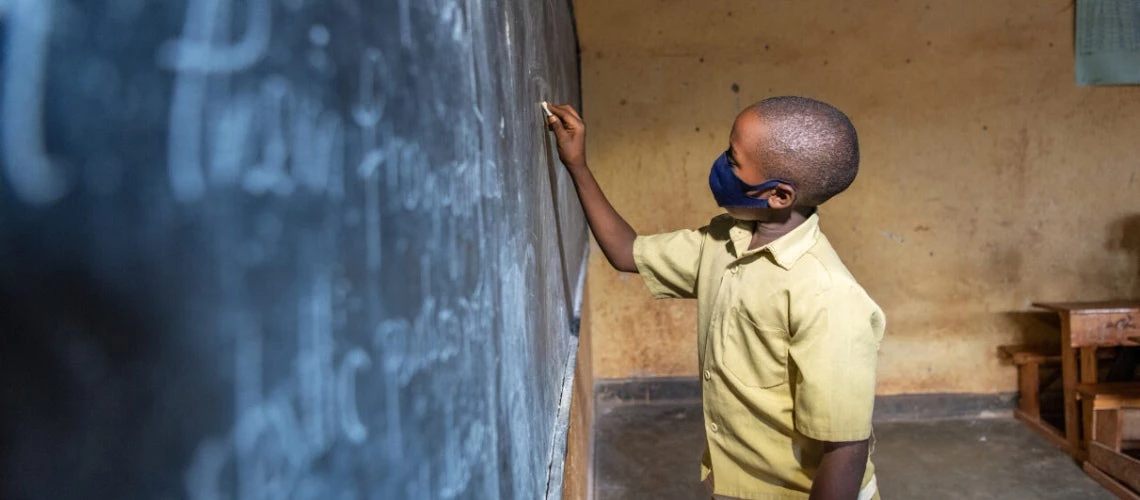 A recent pledge commits partners to ensuring that all refugee children are included in national education systems. Copyright: UNHCR/Samuel Otieno
A recent pledge commits partners to ensuring that all refugee children are included in national education systems. Copyright: UNHCR/Samuel Otieno
On this year’s International Day of Education, we reflected on the almost 15.5 million refugee children and youth worldwide. More than half of these children are not in school, with significant additional challenges for girls, children with disabilities, and other vulnerable groups.
The scale and increasingly protracted nature of displacement makes it critical to act so that refugee children can realize their right to education. Failure to act risks stoking up more conflict in the future.
Coordinated action to support refugee education
In recognition of this challenge, the World Bank, UNHCR and the UK came together with Germany, Canada, UNICEF, the Global Partnership for Education and Education Cannot Wait in the run up to this year’s Global Refugee Forum to help develop a ‘mega pledge’ for coordinated action on refugee education. The pledge commits partners to ensuring that all refugee children are included in national education systems, which are adequately supported to cater to the needs of both host community and refugee children. Where temporary education programmes are needed, they should be designed and implemented to support a transition into the national education system.
To date, 143 countries and organizations have signed onto the pledge. These include pledges from refugee hosting governments, such as Ethiopia, Chad, Kenya, South Sudan and the Democratic Republic of the Congo, donor countries such as Germany, the US, the EU, and Canada, and a range of civil society, private sector and international non-government organizations.
The UK, World Bank and UNHCR: Working together for refugee children
The UK announced support of £4 million to help deliver on the UK’s commitment to champion longer term approaches to protracted displacement. The UK will partner with the World Bank, UNHCR, and others to help host governments make faster progress on including refugees in their national education systems. The pledge recognizes that inclusion is not always feasible, and where this is the case, the UK will work with its partners to support alternatives.
The World Bank has established the Inclusion Support Programme for Refugee Education (INSPIRE) as a mechanism for supporting host governments. The initiative seeks to provide predictable concessional financing to countries that open their schools to refugee children—bringing these policies and pledges to life for the refugee communities within their borders. Working with partners, INSPIRE will help countries implement programs to help transition refugee populations into host country schools.
UNHCR will work closely with the World Bank and the UK to deliver on the critical commitments outlined in the Global Compact on Refugees. The goal is to open up quality, accredited education opportunities for refugees and provide technical and resource support to host governments to include refugees in national systems in a way that strengthens those systems for all children. UNHCR will also support the continuity of education services such as school management, child protection, and teacher salaries during emergencies and while transitioning into public education – a process which can take many years. At country level, UNHCR has committed to ensuring that coordination is streamlined to align emergency and development approaches and build the needs and opportunities for refugees into government-led comprehensive national approaches.
Moving forward
The education mega-pledge represents an important and dynamic shift in how refugee education is supported and delivered. It lays out a clear goal for inclusion – where refugee children attend public schools alongside host community children and financing flows through government channels. It aligns refugee education outcomes with national SDG targets, so host governments and the international community are accountable for improving access to quality education for refugees and host community children alike. It prioritizes service delivery through national education systems and commits to providing the financing and technical assistance required to address host governments’ challenges to inclusion.
Ultimately, it signals to host governments that the international community will be an ally and partner in sharing the responsibility of delivering quality education to refugee and host community children. Having heard the promises of government pledges and corresponding international commitments, it’s now time to implement these ideas, such that promises become real education gains for refugee children.
To receive weekly articles, sign-up here




Join the Conversation